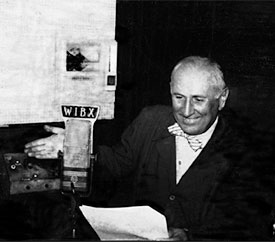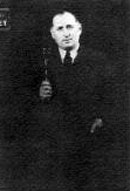It is now common knowledge of the contributions made by immigrants toward the prosperity and growth of the United States of America. Upon landing in the USA, they soon discovered that with diligence and hard work, one could become whatever they desired to be. And what a job they did. Life in America was not that easy. They were not exactly welcomed with open arms in many segments of the community, especially if you "talked funny" and a "funny" sounding name. But persist they did and they became productive members of the community in which they settled.
The immigrants – became Americans by choice.

Undated Photograph of Louis K. Bienkowski at the WIBX Radio Studio - Utica, New York
(Andrew Bienkowski Collection)
In preparing this piece on the life of my near, dear friend, Louis K. Bienkowssi, I found scant little about his life in Poland. In fact there is an uncertainty as to his birthdate. It is known that he served as an officer in the Polish Army in World I and was severely wounded. He had earned a degree from the Academy of Arts in Krakow, Poland. He was a talented illustrator which talent served him well when he obtained employment as a graphic artist in Hollywood, California. I wish I had known this when we worked together at WIBX. I would have requested more information about his early life. My first assignment at WIBX radio when I was hired was a control room operator, the person who played his Polish music records at 78 rpm – on cue. Louis did his announcing from Studio A and I was in the cubicle referred to as the control room. A photo of that room and the turntables is shown in the Gallery.
In 1927, Louis K. Bienkowski left California and went East and settled in Utica, New York. In 1929 he took his oath of allegiance to the United States of Ameica. Upon a return trip to Poland for a visit he happened to listen to a radio station in Poland which was featuring music by the Paul Whiteman orchestra. It was then that Louis decided that if the people of Poland enjoy American music, why couldn't the Polish people in America listen to their music? And so a legend was born. Upon his return to America, and to Utica, New York, Louis sought out the owner and operator of WIBX Radio and presented the idea to him. And so Echoes of Poland radio began an era in foreign language broadcasting which continues to this day on the same radio station, the longest running Polish language program in the USA.
Louis would canvass local business people and sell advertising on his program on WIBX. And he did extremely well. Almost all local business was located in the downtown Utica area. Because of the large Polish population in Utica, Louis did extremely well in moving goods and services to the delight of the advertisers.
Zosia's Bridal on Blandina Street, men's clothing stores on Columbia Street as Kowal's Men's Store and Koenig's Men Shop located on the opposite side of Columbia Street. Farther down Columbia was the Utica Hammer Supply, another weekly advertiser, to mention just a few. His radio program time on air was jam full of advertisers; it brought in a lot of revenue to WIBX.
At the same time, Louis Bienkowski was associated with the only Polish language published in the Mohawk Valley, Slovo Polski ("The Polish Word"). The newspaper was owned by John and Maria Kowalski. But the very clever Louis Bienkowski was able to move out the husband, win over the hand of the wife and made her his wife. They also operated the Fort Schuyler Printing Press as well. It worked just fine that while Louis attempted to sell newspaper space in his Polish language, he was able to sell air-time on his radio program, Echoes of Poland. The printing operations and the publication of the Polish language newspaper ended when Maria passed away in 1965.

Louis Bienkowski promotional photo.
In additions to his radio programs and newspaper publishing, Louis became involved with community organizations and causes. He was made an honorary member of the White Eagle Association. He volunteered his time, efforts and money to the various Polish organizations and charities both here in American and in Poland.
His main fund raising effort was in behalf of the Laski Institute for the Blind in Poland. It all started from his World War I experience. As mentioned, he was severely wounded and sent to a hospital to recover. His hospital bed was located next to a window from which window Louis would wave to a little girl who appeared daily in a window in a house across the way. But she never waved back. He learned later from the girl's mother that the little girl was blind. A tall, husky individual, Louis Bienkowski was all heart.
My personal highlight occurred when I had the opportunity to be selected to run for Utica Public office. Of course, I had to purchase radio time on his highly successful radio program. But he did me a personal favor. He prepared the script in Polish which he wrote phonetically. I would read the Phonetic polish words. The recorded announcements “spots” were advertised on his program. Well, all I can say, I won that election and all others when I advertised on his Echoes of Poland radio program.
His last year was spent as a guest of the Presbyterian Home in New Hartford. And it was here he passed on to his eternal reward December 15, 1984 at the age of 87 years. Louis, Bog.